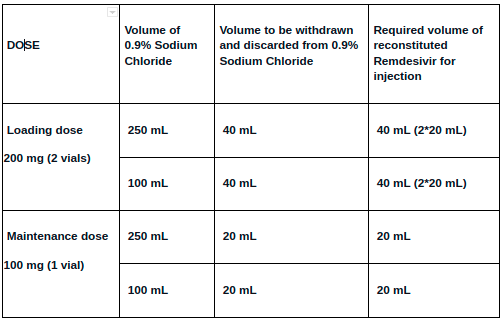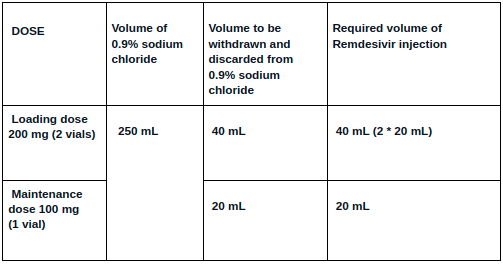Overview:
Remdesivir is a nucleotide prodrug of an adenosine analog that belongs to the group of antiviral medications. It was first developed to treat hepatitis C, and later it was used to treat the most infectious Ebola virus in 2014. It was developed by a United States-based biotechnology company. It was also used for treating middle east respiratory syndrome (MERS) and severe acute respiratory syndrome (SARS). It is also used to treat influenza, flu, etc. According to the World Health Organization’s health experts, Remdesivir is one of the medications that shows some significant effects in treating COVID-19 hospitalized patients. Generally, Remdesivir binds with viral RNA-dependent RNA polymerase and inhibits viral replication by terminating RNA transcription prematurely. Indication of Remdesivir intravenous gots is approved by the Food and Drug Administration (FDA) for the treatment of COVID-19 in adults and pediatric patients aged above 28 days and weighing more or equal to 3 kilograms. In nonhospitalized patients with mild to moderate COVID-19 symptoms who are at high risk of progressing to severe disease, Remdesivir is started within seven days of onset and administered for three days. Hospitalized patients receive Remdesivir for five days or until hospital discharge.
Drug group:
Remdesivir belongs to the class of broad-spectrum antiviral medications. Broad-spectrum antiviral medications are effective against a wide range of viruses. The other antiviral drugs are Vidarabine, Acyclovir, Ganciclovir, Zidovudine, Lamivudine, Ribavirin, Interferons, etc.
What Is Remdesivir Used For?
Remdesivir is used for treating conditions such as:
-
Severe Acute Respiratory Syndrome (SARS-CoV).
-
Middle East Respiratory Syndrome (MERS-CoV).
Consult the physician for more information.
How Does Remdesivir Work?
Remdesivir is an antiviral medication. It is a nucleotide analog. Usually, when a virus enters the body, the RNA polymerase helps the virus to replicate. In that case, when Remdesivir medication is given, it inhibits the action of RNA polymerase. However, as the drug gets incorporated into the RNA, additional nucleotides cannot get added up. Hence it ends up terminating the RNA transcription process.
How Does Remdesivir Work Against COVID-19?
Coronaviruses have single-stranded RNA. When this novel coronavirus enters a human cell, it starts to replicate with the help of an enzyme RdRP. Remdesivir acts by inhibiting the enzyme RdRP. Studies say that it is one of the most significant medications for treating COVID-19. It is used to treat COVID-19 affected hospitalized patients. The uses and effects of the medication may vary from person to person.
How Is Remdesivir Given?
Remdesivir must be administered under the supervision of a healthcare provider. It must be given through intravenous infusion only and does not get administered by any other route. It is usually administered once daily for five to ten days. The treatment may vary from person to person. It depends on how well the body responds to the medication. Remdesivir medication is available in two dosage forms:
-
Remdesivir for injection is available as 100 milligrams lyophilized powder in a vial, which needs to be mixed with sterile water for injection prior to diluting in a 100 milliliters or 250 milliliters 0.9 % Sodium Chloride infusion bag.
-
Remdesivir injection is available as 100 milligrams/20 milliliters solution in a vial, which must be diluted in a 250 milliliters 0.9 % sodium chloride solution.
Any parenteral drug products should be monitored for any discoloration prior to administration. The vial has to be discarded if any discoloration is noted.
Do not administer any other medications along with this Remdesivir injection. Usually, Remdesivir injection is infused intravenously for over 30 to 120 minutes.
Remdesivir injection can cause allergic reactions during and after infusion. The healthcare provider will monitor the patient carefully. Inform the healthcare provider if the patient experiences any of the following symptoms:
-
Dizziness on standing up after the infusion.
-
Nausea and vomiting.
-
Chills.
-
Shortness of breath.
-
Fast or slow heartbeat.
-
Swelling of the face, lips, eyes, or tongue.
For knowledge, the patient can ask the information or details about the medication from the healthcare provider.
Dosage:
Recommended Dilution Instructions- Reconstituted Remdesivir for Injection Lyophilized Powder

Recommended Dilution Instructions- Remdesivir Injection (Supplied as Solution in a vial)

What Should the Healthcare Provider Do If the Patient Experiences Any of the Above Symptoms?
The healthcare provider needs to either stop the infusion or slow down the infusion if the person experience any of the above symptoms.
How Is the Combination of Remdesivir And Corticosteroids?
As per the studies, Remdesivir can be effectively used in combination with Dexamethasone for hospitaized Covid-19 patients, especially those affected severely. This combination of drugs provide a clinical benefit. However, studies have also been carried out for combination of Remdisivir with other immunodilators like Baricitinib and Tocilizumab.
What Should the Patient Inform the Healthcare Provider Before Getting Injected With Remdesivir?
-
Ask the healthcare provider about the ingredients of the medication. Check if the patient is allergic to any of the ingredients of Remdesivir. If so, please inform the healthcare provider before getting injected.
-
Inform the healthcare provider about the medications, vitamin supplements, nutritional supplements, or any other herbal supplements the patient is taking or planning to take. The patients should be sure to inform if they are taking Chloroquine or Hydroxychloroquine so that the healthcare provider may change the dosage. Hence the patient will not end up taking an overdose.
-
Inform the healthcare provider if the patient has had kidney or liver disease.
-
Do inform the healthcare provider if a female patient is pregnant or breastfeeding, or planning to get pregnant.
What Are the Drug Interactions?
Due to the antagonism observed in cell culture, the use of Remdesivir with Chloroquine phosphate or Hydroxychloroquine sulfate is not recommended.
Drug-drug interaction trials of Remdesivir and other concomitant medications have not been conducted in humans.
Can Remdisivir Be Given in Pregnant Patients?
Although pregnant females were excluded from the clinical trials of Remdisivir treatment in COVID-19, preliminary results from small studies and case reports have been affirmative. Remdesivir treatment can be given to pregnant patients if indicated. The data from case reports show that using Remdesivir in pregnant women is not enough to evaluate the associated risk of major birth defects, miscarriage, or adverse maternal or fetal outcomes. However, do inform the healthcare provider if the patient is pregnant or planning to get pregnant before administering the drug.
What Are the Warnings and Precautions?
-
Lactation/ Breastfeeding:
There is no available data on the effects of Remdesivir on milk production.
-
Pediatric Use:
The safety and effectiveness of Remdesivir for the treatment of COVID-19 have been studied in pediatric patients of 12 years and above and weighing 40 kilograms and more. Remdisivir was found to be well tolerated by them. However, for infants and neonates of less than 12 years of age and weighing less than 40 kilograms, there is extremely limited data available.
- Geriatric Use:
The clinical reports available have not identified any differences in responses and effectiveness between the elderly and the younger patients. However, in general, caution should be exercised in the administration of Remdesivir and monitoring of elderly patients reflecting any comorbidities such as hepatic, kidney, liver disease, or any other drug therapy.
-
Overdosage:
There is no human experience of acute overdosage with Remdesivir. Treatment of overdosage should consist of general supportive measures, including monitoring of vital signs and observation of the clinical status of the patient.
What Are the Side Effects of Remdesivir?
The side effects most commonly experienced after infusion are the following:
-
Nausea and vomiting.
-
Sweating.
-
Chills.
-
Increase in the levels of liver enzymes.
-
Rash.
There are also some uncommon and rare side effects like:
-
Slow heartbeat.
-
Difficulty breathing.
The healthcare provider should monitor for the side effects during and after the infusion.
Conclusion:
If a patient is allergic to any of the ingredients, or experience any of the above-mentioned symptoms, please do inform the healthcare provider. Though Remdesivir was the first drug approved by FDA for treating the SARS- CoV-2 virus, studies are still going on. Enough data is not available for all age groups, and for people under different conditions, so necessary precautions should be followed.













